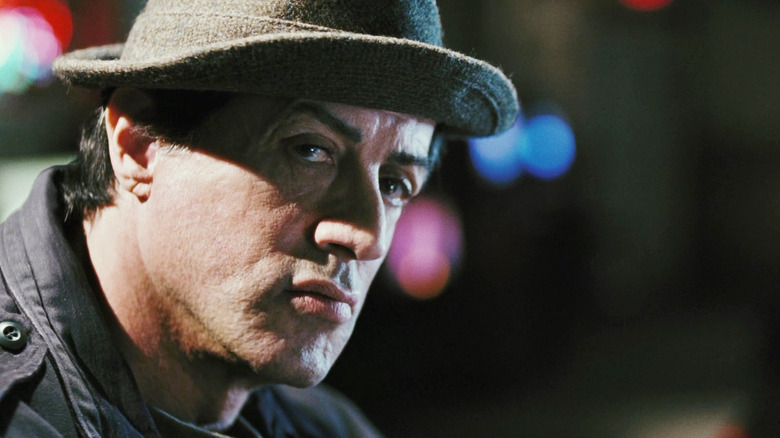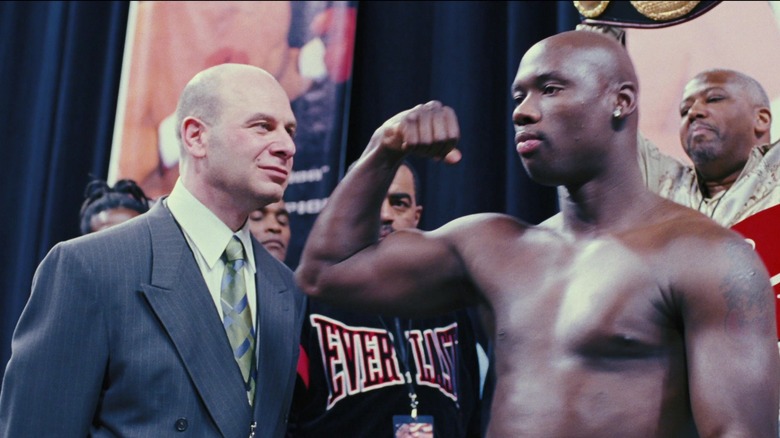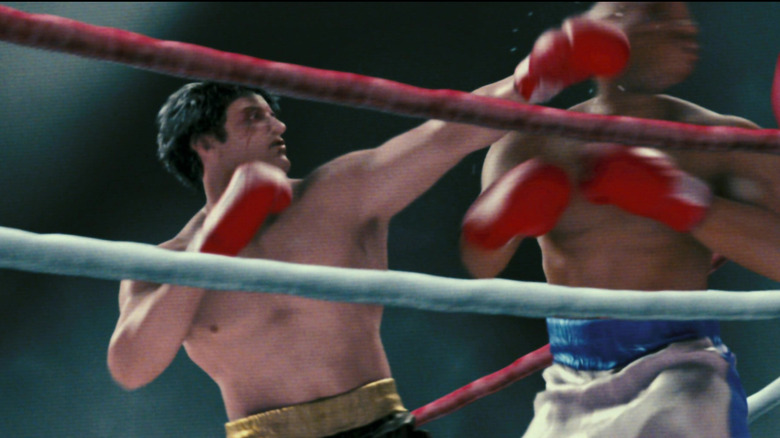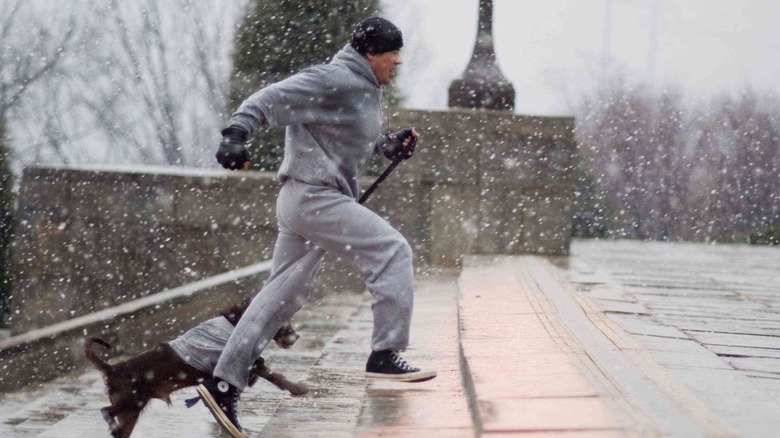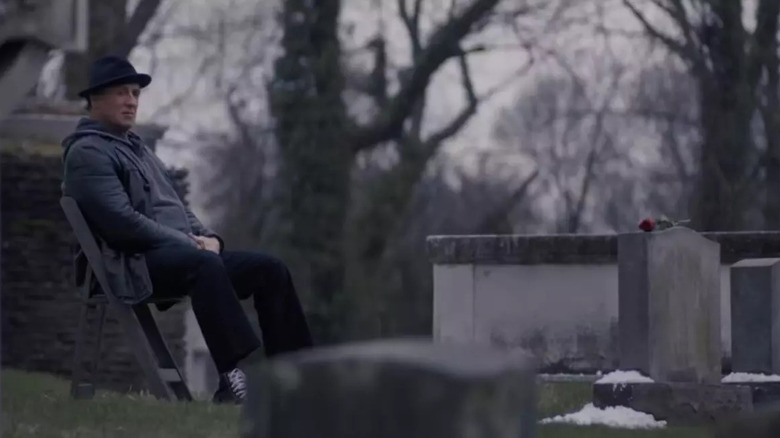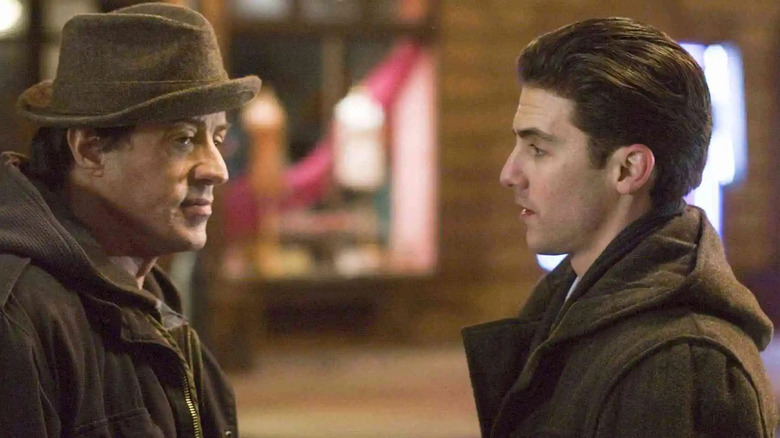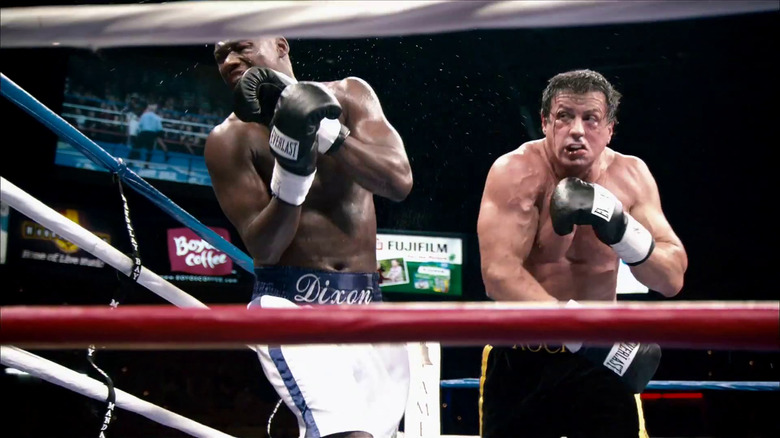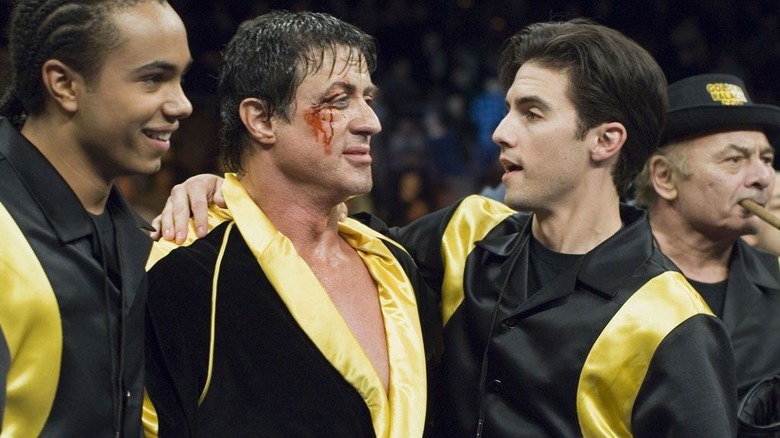Rocky Balboa Ending Explained: Welcome To Rocky World
I have to admit that I thought "Rocky Balboa" sounded pretty awful at first. 16 years after the popular franchise came to a disappointing close with "Rocky V," Sylvester Stallone was bringing his famous fighter back for one last shot at glory in his sixties. Surely it was going to be bad, right? Instead, Stallone proved once again that you can never write off the Italian Stallion, creating one of the most emotionally-satisfying entries in the whole series, a movie that took a heartfelt look at aging, loneliness, and grief before delivering a typically rousing finale. It is a fitting end to the "Rocky" saga in a way the fifth movie definitely wasn't, which is what motivated Stallone to give Rocky another comeback. He told the Chicago Sun-Times:
"I wanted to wrap up Rocky's story with a sense of hope, and 'Rocky V' didn't have that feeling at all. In fact, I thought it left people disenchanted, and that was kind of it."
"Rocky Balboa" represented a comeback for Stallone himself, also directing an entry in the franchise for the first time since the fourth movie. After "Rocky V" left audiences with such a sour taste, his action hero career effectively came to a close after a string of blockbusters including "Cliffhanger," "Demolition Man," and "Daylight" before he received acclaim for his impressive turn in "Cop Land." His thoughtful performance proved his credentials as a "serious" actor, but further quality roles were not forthcoming. Instead, Stallone found himself starring in dross like "Avenging Angelo" and the dire "Get Carter" remake.
Released 30 years after the Oscar-winning original film, "Rocky Balboa" was a reset for the title character and its director, its critical and commercial success paving the way for the "Creed" spinoff series. Let's take a look at how the old brawler's final fight plays out.
So what happens in Rocky Balboa again?
Unlike all the other sequels in the "Rocky" series, "Rocky Balboa" wisely doesn't open with a recap of the much-maligned previous movie. Instead, we drop in on the current undefeated heavyweight champion Mason "The Line" Dixon (Antonio Tarver) getting booed and pelted with ice by the crowd after giving another substandard challenger a pasting. He may boast a 33-0 win streak but the public hates him, and a commentator laments the sport's lack of a "warrior who thrills us with his passion."
Cut to the mean streets of Philadelphia, where we find aging Rocky Balboa (Sylvester Stallone) on the anniversary of his wife Adrian's (Talia Shire) death. The grieving former champ hasn't got much going for him, mooching about his old neighborhood with only Paulie (Burt Young) and his terrapins Cuff and Link for company. With his boxing career long behind him, he now runs a small Italian restaurant (named Adrian's, of course) where he goes through the motions telling stories of his victories to the diners. He is also estranged from Rocky Jr. (Milo Ventimiglia), who works as a corporate drone in the city and now goes by his Christian name Robert to put a little distance between himself and his famous dad.
Struggling to cope with his mourning, Rocky is inspired to take up boxing again by an ESPN feature predicting the outcome of a fantasy fight between him and the current heavyweight champ. Just local stuff, small-time fights, he tells his son, reasoning it will be an outlet for his feelings. He finds it hard to get a new license at first, but the boxing association committee relents after he delivers an impassioned speech. It soon turns out that those small fights he talked about will turn into a very high-profile exhibition match.
The computer simulation
The catalyst of the story in "Rocky Balboa" is an ESPN "Then vs Now" computer-simulated fight between the unpopular current heavyweight champion Mason Dixon and the two-time former champ Rocky Balboa. The pundits weigh in with their predictions before the digital Italian Stallion wins by knockout. The fantasy match-up really catches the public's imagination, not to mention Rocky's.
In the opposite camp, Dixon is despondent because he can't get any respect despite his mammoth 33-0 record, with his critics claiming he has been spoonfed easy opponents to defend his title against. In an effort to boost his popularity and secure a lucrative payday, his promoters suggest a charity exhibition match against Rocky. Rocky is reluctant at first, but the opportunity is too big to pass up.
This aspect of the film was inspired by a fantasy bout between Muhammad Ali and Rocky Marciano in 1970, staged at a time when they were the only two undefeated heavyweight champions in boxing history. Supposedly to settle any fan disputes about who would win the fight, the two legends sparred for 75 one-minute rounds and the footage was edited together according to the findings of a computer, which analyzed their fighting styles and other data to predict the outcome of a real head-to-head.
It was called "The Super Fight," itself spawned by an earlier fantasy boxing knockout tournament using the same computer in which Marciano was crowned victorious while Ali filed a defamation suit after his sim was dumped out in an earlier round by Jim Jeffries. The filmed imagining of the Marciano-Ali match screened in 1500 theaters across North America and Europe but confusingly threw up two different results. American and Canadian audiences witnessed Marciano win by knockout, while European fans saw the referee stop the fight after Marciano was cut.
Is Rocky too old to fight again?
In "Rocky Balboa" our hero is 60 years old, which is surely way too old for him to be fighting against a champion half his age, right? Well, it might be stretching credibility even in a charity match, but there is a long history of pro fighters still battling away well into their advancing years. Larry Holmes was 52 years old when he beat Eric "Butterbean" Esch, 16 years his junior, in his final fight, while Jack Johnson, the first African-American heavyweight champion, boxed until he was 60 (via Oldest.org.) Meanwhile, in the UK, Cruiserweight Steve Ward twice claimed the Guinness Book of World Records for the oldest boxer before finally retiring two years later at the age of 61.
From the land of Hollywood, Mickey Rourke returned to the ring for his first fight in two decades aged 62, having previously dropped acting for a career in the sport during the '90s. In an exhibition match in Moscow of dubious merit, Rourke fought Elliot Seymour, a boxer less than half his age, and won when the referee stopped the fight. It must be said that the younger fighter wasn't the toughest opponent, going into the bout with a 1-9 record.
Rocky's age has always been a factor in the series as he was already 30 when he faced Apollo Creed (Carl Weathers) in the first movie but it adds an extra dimension to the usual underdog tale in the sixth film. In a rousing pre-training montage speech, Apollo's former trainer Duke (Tony Burton) lays it all out: Rocky doesn't have the speed to defeat Dixon, and the effects of aging rule out sparring. So he'll have to go back to what has always worked for him in the past, a lot of heart and "blunt force trauma."
Adrian's influence from beyond the grave
Throughout the entire "Rocky" franchise, Adrian (Talia Shire) provides her husband with the confidence and encouragement he needs to get past each obstacle on his rise to the top. In "Rocky Balboa," her influence is no less strong even after she has passed away. Rocky describes the grief of her loss as like a "beast" inside him and, after watching the ESPN simulation fight with Paulie, realizes that the only way to channel the pain is to start boxing again.
In Adrian's absence, the film provides Rocky with a tentative love interest in Marie (Geraldine Hughes). She was a minor character in the original film 30 years earlier, and here she's all grown up into a single mother with a moody teenage son, Steps (James Francis Kelly III). Rocky half-heartedly woos her and gives her a job at his restaurant, but it is clear that she'll never be any kind of rival to his dearly departed wife.
Marie does prove crucial, however, in standing in for Adrian to deliver the usual pep talk Rocky needs as he approaches the exhibition fight against Dixon. "Fighters fight," she states simply, and that's enough to get Rocky's head in gear. You have to feel a little sorry for her because it has always been about Rocky and Adrian, even to the detriment of their son on occasion; just take "Rocky IV," when the pair leave him home alone at Christmas while heading off to Moscow for the Ivan Drago fight.
Rocky surely deserves a second chance at love but it's fitting that the film closes with him visiting Adrian's grave again and, echoing his triumphant shout-out in the second movie, tenderly says, "Yo Adrian. We did it."
Rocky's has problems with his son... again
"Rocky Balboa" returns to one of the most interesting aspects of "Rocky V" in Rocky's relationship with his son. In the earlier film, teenage Rocky Jr. struggles with bullies at his rough new school and becomes resentful towards his dad when Rocky gives all his attention to the young fighter he's training. They patch things up, but 16 years later their relationship is strained again.
Robert is now a quiet young man who works in the city and cringes at the mention of his dad's name. Having grown up in his famous father's shadow, he has tried to build a separate life for himself by putting distance between them, but the renewed attention generated by the upcoming charity fight threatens to make things worse. He's worried that Rocky is going to make a fool of himself boxing again at his age and he'll become the butt of the joke as a result.
For a while, it looks like the screenplay is setting up another reason for Robert to feel bitter by providing another rival for his father's affections. When Rocky starts dating Marie, he also forms a bond with her son Steps, whose father is absent. The dramatic possibilities of this potential clash aren't explored at all; both young men end up in Rocky's training camp, but they don't exchange a single line of dialogue.
Overall, the father-son thread doesn't pay off nearly as well as it should, even in comparison to the film's clodhopping predecessor. It does, however, produce one of the entire series' most heartfelt speeches from Rocky:
"You, me, or nobody is gonna hit as hard as life, but it ain't about how hard you hit. It's about how hard you can get hit and keep moving forward, how much you can take and keep moving forward. That's how winning is done!"
The final fight
The 10-round exhibition match between Rocky and Mason Dixon is a bit of a mixed bag. Some of the handheld camerawork makes it feel like a real pay-per-view event and the fight itself is less choreographed and more realistic than some of the previous films. It loses a lot of that veracity when Sylvester Stallone becomes a bit too enamored with flashy editing and draining all the color from the frame, apart from the stripes on Rocky's shorts and blood running from his nose. It's distracting and loses a lot of the tension.
The fight opens in the same way as the computer simulation, with Dixon stinging Balboa with a series of jabs. Rocky tries to edge his opponent into the corner but is made to look clumsy with a wild swing that Dixon ducks out of easily. It happens again and Dixon sends him staggering, but the old pro retaliates with a flurry of big shots. The first round ends with the two fighters hammering away like a couple of Rock 'Em Sock 'Em robots.
The second round begins with Dixon on top again, knocking Rocky down twice. Rocky keeps going doggedly and he senses an opportunity when Dixon hurts his left hand pounding on Rocky's midriff. The Italian Stallion responds by taking Dixon down with a series of brutal body blows.
The fighters slug it out for the next seven rounds. No one in the arena can believe Rocky is still going, but hey, that's what Rocky does. The final round starts badly as he is sent down to one knee. With the crowd chanting his name, Rocky summons his resolve as rises yet again. The two fighters are going at it toe-to-toe when the final bell rings.
Welcome to Rocky World
The fight goes to a split decision and with that, "Rocky Balboa" brings the series full circle. As with Rocky's first bout against Apollo Creed, the result of the fight is mostly unimportant, announced in Mason Dixon's favor in the background while Rocky and his team are soaking up the adulation of the crowd. It may not be an actual victory, but it's another rewarding moral victory for the former champ, silencing the naysayers once again and giving him a sense of worth at a tough time in his life. More importantly, it helps him overcome his grief for Adrian; he tells Paulie after the final bell rings, "That beast is gone now. The beast is out."
Toward the end of the fight, one of the commentators says admiringly: "Welcome to Rocky World." That made me think about the series as a whole, as I sat there rooting for Rocky in an exhibition match with no stakes other than his self-worth for about the third time, and I also thought about watching the first four movies with my family as a kid, all of us on the edge of our seats and cheering him on. It may be easy to poke fun at the "Rocky" movies, especially the more cartoonish middle installments, but Stallone has done a rare thing, creating a popular hero who lives deep in people's affections to this day. He might not be the brightest, but he shows the resolve and courage we'd all like to show when it comes to the crunch. Perhaps more importantly he's a nice guy who wins, and his open-heartedness is especially appealing in an often ironic and cynical world.
In our era of cinematic universes, I think "Rocky World" is probably the one I like the most.
